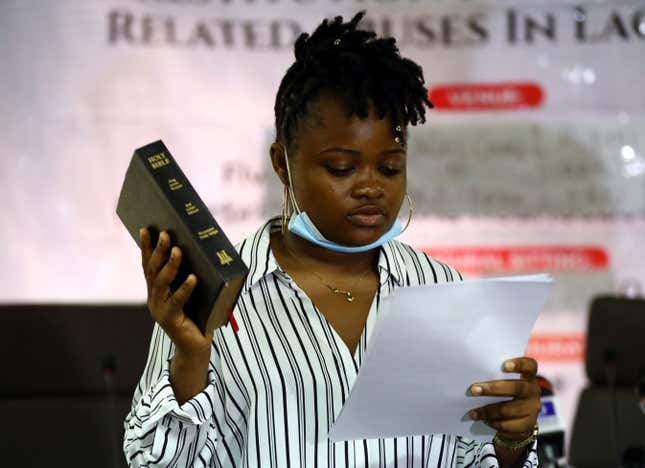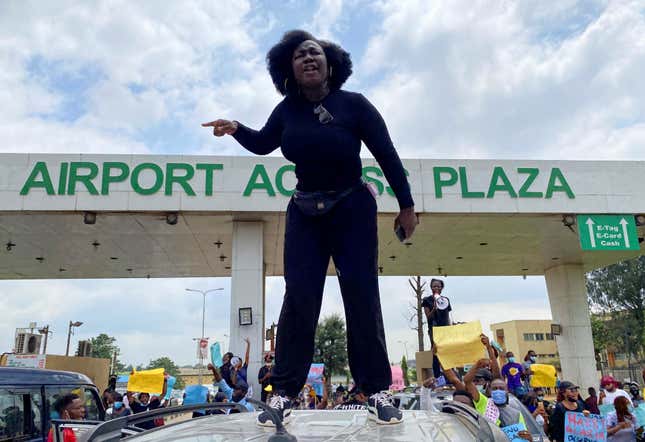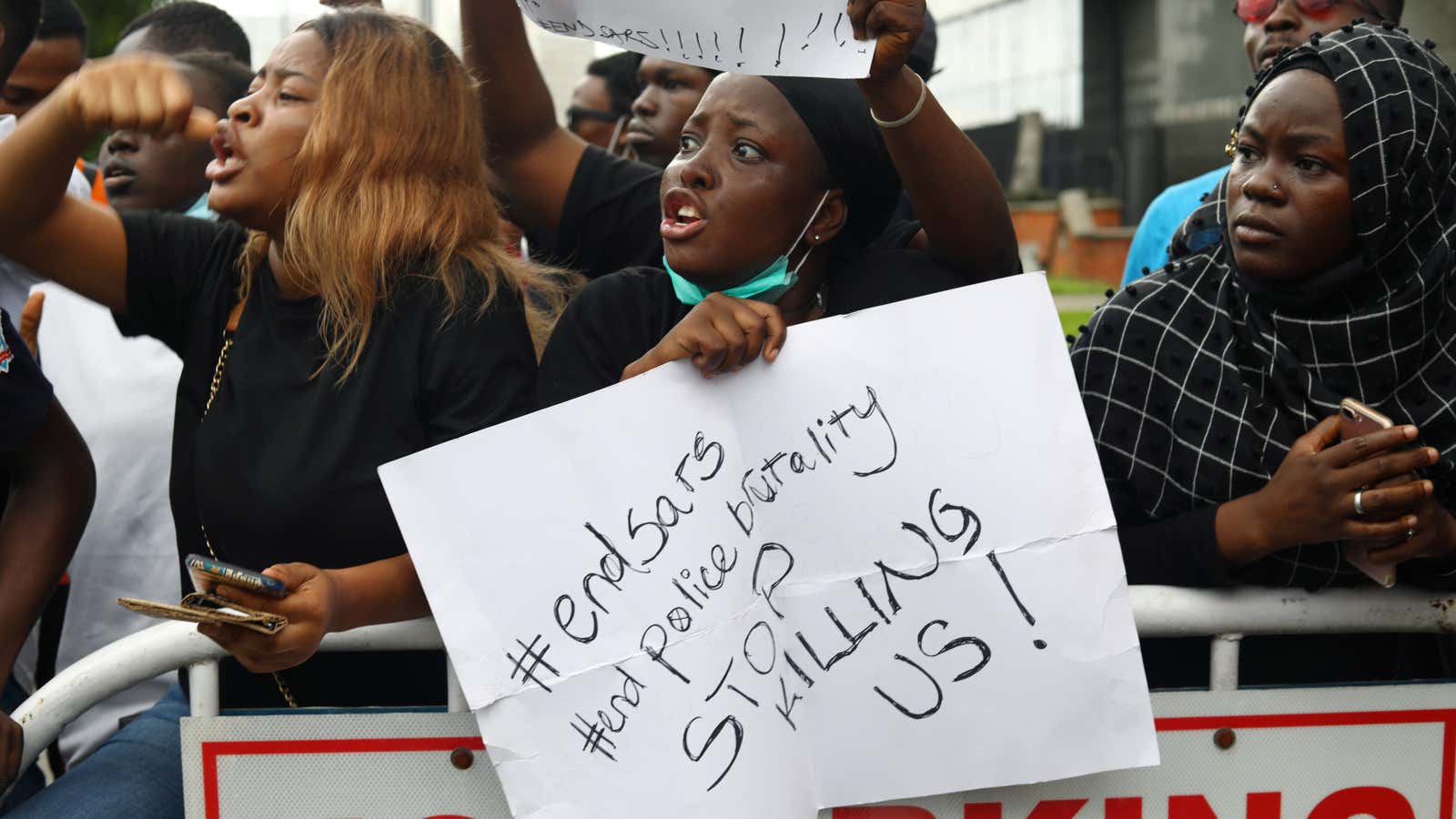For nearly three weeks, starting Oct. 8, Nigeria found itself reeling from multiple demonstrations across the country after a video showing a member of the Special Anti-Robbery Squad (SARS) killing a man surfaced on social media, sparking public outcry.
Young Nigerians, long profiled by SARS, a police unit notorious for kidnapping, extortion, torture, and murder, demanded its dissolution. Their discontent forced the usually slow response Nigerian president Muhammadu Buhari to act and his government announced the disbandment of the unit three days after the protest began. But the protesters refused to let up, seeking tangible efforts from the government as proof that the already four-times disbanded entity was gone for good.
In comparison to other recent movements in Nigeria, EndSARS demonstrators consisted mostly of young Nigerians in their twenties and thirties and cut across class, ethnic, and religious distinctions.
But perhaps the most distinctive characteristic of the protest was the prominence of young women in steering and sustaining the movement. It’s worth noting while many of the high-profile cases of police brutality have been predominantly inflicted on young men, Nigeria’s police have also been linked to numerous sexual assault and violent incidents against women.
Most notably, the Feminist Coalition, a group consisting of 14 women from various forms of activist and non-political backgrounds, became the unofficial rallying voice and coordinating center for the EndSARS movement after establishing a fund that raised nearly 150 million naira ($393,700) to support protesters.
Through their helpline, they delivered medical support, legal assistance for the detained and security. The group’s nimble coordination and efficiency left protesters like Rinu Oduala in awe.
“I couldn’t believe my eyes,” said Oduala, a brand strategist who organized one of the protests in Lagos, Nigeria’s largest city. “Women were and still are an integral part of the protest. It wouldn’t have gone on for long without them,” she added.
In addition to protesting on the ground, Oduala raised roughly 4 million naira ($10,500) to provide ground support, including accommodation, transportation, and meals, to protesters and currently serves as a member of the judicial panel in Lagos investigating police brutality.

Saratu Abiola, a writer and development professional based in Nigeria’s capital, Abuja, chalked women’s prominence and participation in the protest to various demonstrations they’d organized recently, such as the 2019 market march against harassment in marketplaces and the State of Emergency protest which put a spotlight on the country’s rape epidemic earlier in the year.
“Nigerian women have been primed for fighting [because] we spend so much time fighting,” said Abiola. “So when [the EndSARS protest] happened it was easy to mobilize. It’s become an instinct.”
While national history often erases the contributions of Nigerian women activists at worst, or portrayed them as appendages to their male counterparts at best, for centuries they have actively influenced governance and policies using petitions, tax evasion, protests, and revolts.
Famously, when British colonial officers refused to give permits for demonstrations, activist Funmilayo Ransome-Kuti mobilized local market women for what she called “picnics” and festivals. Even before that in the late 19th century Igbo women in the southeast of modern Nigeria became activists through persistent petition writing to influence the British during that period.
These strategies live on, with women participating in the fore as seen in the EndSARS movement both as organizers but also with plenty of female representation on the ground in a society known for its patriarchal attitudes.
But the battle for change has also come with its challenges from some in power threatened by any challenge to the status quo, particularly when it comes from young women. Perceived as the protest’s primary funders, members of the Feminist Coalition has declined requests for comment publicly after threats from individuals claiming to be with government security agencies. There have been moves to pin any violence around the protests on to the organizers even though most of the violent acts have come from those trying to disrupt the peaceful protests.
On Sunday (Nov. 1), Moe Odele, a lawyer for the coalition and one of the legal activists coordinating national efforts to protect the rights of arrested protesters, was herself stopped at the airport on her way out of the country. Odele has since shared that she’s “fine” and “safe” but added: “We haven’t confirmed yet why I was stopped on Sunday or by whom. But I’ve been invited back in with my lawyers today.”
Though there has been widespread support for the protests at home and in the diaspora even in its aftermath, there are still a few who seem threatened by the role of women in leadership, as captured on social media in a tweet by Ire Aderinokun, who designed the popular Feminist Coalition logo. The traditional Woman power emblem, a female gender symbol with a fist in the center, was set in black on a yellow background and soon became synonymous with the protests. Thousands of supporters online switched their display photo for their social media accounts, particularly on Twitter.
As well as the Feminist Coalition logo perhaps the most iconic photo from the protests has been of long-time activist Aisha Yesufu, wearing a traditional hijab, standing with her right clenched fist raised in defiance in front of fellow supporters opposite from armed police men. The image was widely shared by Nigerian social media users and quickly turned into a symbol.
Mental health
Another distinct feature of the protest was the provision of psychological support, an important element for demonstrators, according to Oluwaseun Ayodeji Osowobi, founder of Stand to End Rape (STER) Initiative. The NGO expanded its psychological support and counseling resources to help protesters who have been victims of police brutality and find the demonstration mentally overwhelming.
“We wanted to support young people to exercise their human rights and the families of those who had been impacted by [police brutality],” said Osowobi. “We had counselors and mental health specialists who were there helping protesters every step of the way.”
Following the national media regulator’s directive to traditional outlets to not “embarrass government,” websites like the Police Brutality in Nigeria (POBIN) Project provided documentation of extensive incidents of police violence, underpinning the need for reform.
Kemi Falodun co-founded the website in August as a sort of memorial for the Apo Six, a group of young club goers killed in 2005 by police officers in the Apo area of Abuja, Nigeria’s capital.
“I felt a need to have a public record of the stories of police brutality in Nigeria for memory and accountability,” said Falodun, a Lagos-based journalist.
According to Falodun, The POBIN Project saw an uptick in views during the EndSARS protest, and more writers volunteered to work with them to document cases of abuse of power perpetrated by SARS operatives.

One week after the protest began, thugs started attacking peaceful demonstrators in an effort to dampen the momentum. Witnesses in Lagos and Nigeria’s capital, Abuja, claimed the police did not intervene to stop the attacks.
Things came to a head on Oct. 20 when soldiers shot live rounds at unarmed protesters at the tollgate in the Lekki district of Lagos and in Alausa, another neighborhood in the city. According to rights group Amnesty International, the shootings left at least 12 dead and many others wounded.
For its part, the army denied involvement, branding news headlines of the shooting as “fake news”, eventually claiming they were on the scene but didn’t open fire despite video evidence to the contrary. Meanwhile, Lagos state governor, Babajide Sanwo-Olu has launched an investigation into who ordered the shooting.
In the aftermath, organizations like STER Initiative continue to support protesters with post traumatic stress disorder and those struggling survivor’s guilt, while The POBIN Project aims to report the ongoing judicial proceedings on police violence being established across the country.
Amid this backdrop lies a hope that more Nigerians, having observed women at the fore of the EndSARS movement, will begin to appreciate their leadership capabilities.
“Prior, I had several people say to me, ‘You’re a woman. How can you organize a protest?'” said Oduala. “But now, there’s a newfound respect and admiration.”
However, Abiola isn’t optimistic perceptions about women wielding power will change anytime soon. She argued the reason the role of feminist activists in the protest were applauded is because police brutality directly impacted men.
“If you try to center yourself as a woman and talk about the issues you’re facing, you’d be said to be distracting from the larger message,” she said, noting that men generally aren’t interested in women’s rights.
Sign up to the Quartz Africa Weekly Brief here for news and analysis on African business, tech, and innovation in your inbox
